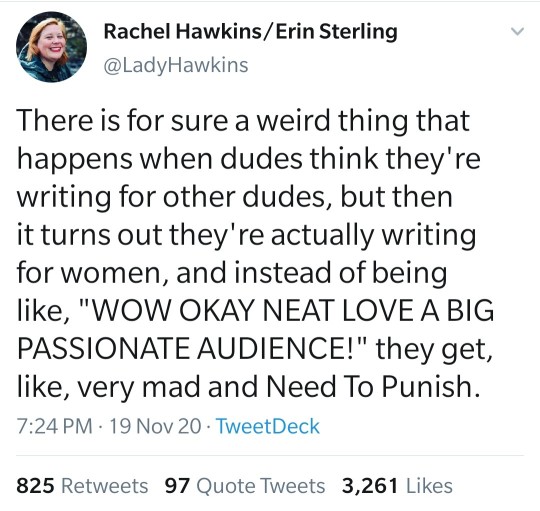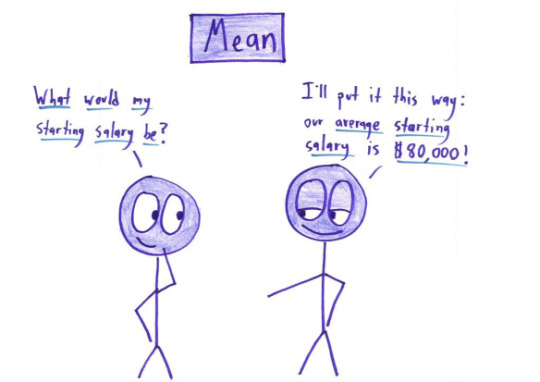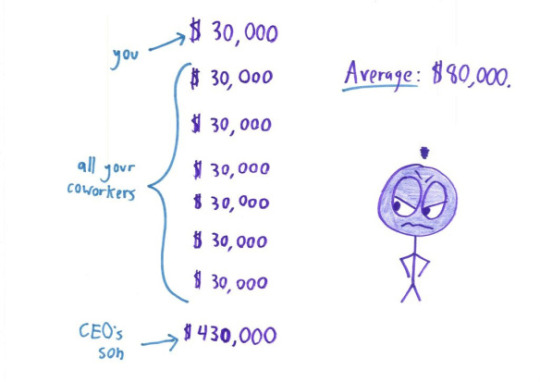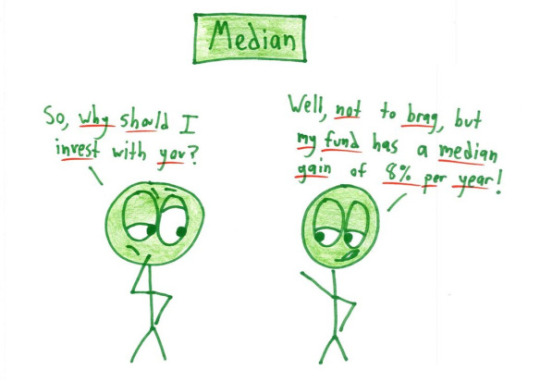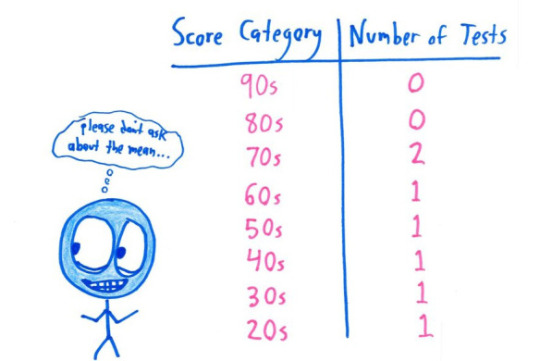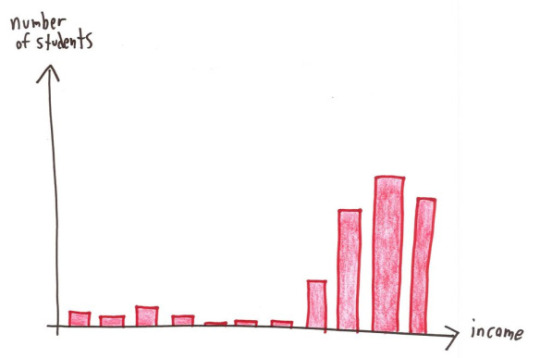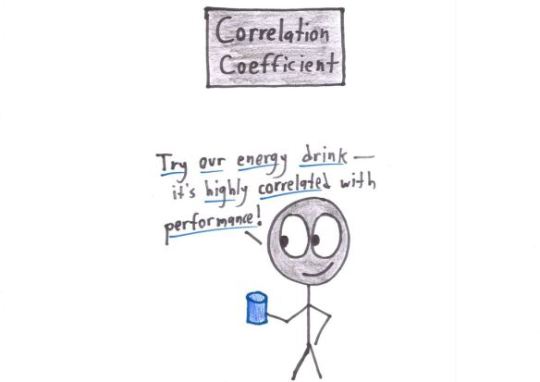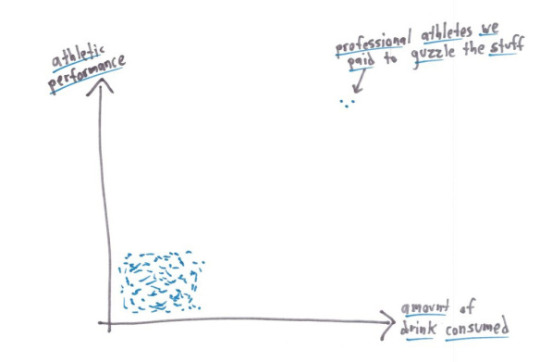Mad pride, neurodiversity, disability rights, youth rights, LGBTQIA+ rights, cognitive liberty, bodily autonomy. Occasional other stuff. She/they. All ages welcome.
Last active 2 hours ago
Don't wanna be here? Send us removal request.
Note
Children cannot consent, you freak.
I'm a proud freak, but if you mean "for sex with adults" (which I'm assuming is what you mean, because that's the only context in which you people ever consider "consent" important, even though most of what I write about is about medical consent) I'd like you to point out where I've ever said otherwise.
8 notes
·
View notes
Text
Sure. But this seems like a bizarre idea not to follow to its logical conclusion, which is: why are we ranking kids?
In a socialist utopia where no one is poor, everyone gets their material needs met, and everyone has exactly equal access to material resources, kids would still vary in skill level. Kids would still vary in the ages at which they acquire certain skills. And that would be... fine, because the only reason "child rankings" matter in the first place is because of economic inequality. The only reason we think a child who learns to read at 5 is "better" than a child who learns to read at 10 is because we assume (not entirely without basis, although as OP points out, the bigger controlling factor is family socioeconomic status) that the "advanced" child will grow up to get a "better job" than the "behind" child and be economically better off. Without that economic inequality, why do we need to rank children at all?
It's so important to remember that when it comes to developmental research, almost everything is confounded* with poverty (*hard to distinguish from). Breastfeeding leads to "better" children? Who has the time, energy, and family support to breastfeed? The middle and upper class (especially in the US which has no paid maternity leave, and guess where a lot of research comes from). So is it really breastfeeding or wealth? Self-control on the marshmallow test leads to better life outcomes? Nope, highly correlated with poverty. Less screen time is important for development? Guess who can pay for better daycare and take advantage of maternity leave? Guess who is stuck using a screen as a babysitter so their family can eat? You can't pick these factors apart; is it the sceentime or is it the thousands of small benefits a child picks up when their parent isn't barely keeping their head above water?
And anyone who replies to this, "Well then the poor shouldn't have children" I'll turn you into Soylent Green because, aside from that being eugenics and all the other reasons, guess what else is highly correlated with poverty? Access to birth control and factual sex education. The solution is to help people out of poverty
Edit: to perhaps be a bit more clear, it's not a parenting "choice" if it's your only option. If someone is choosing formula, or screentime, or whatever because poverty has made them feel like they have no other choice , then you aren't studying parenting you are studying poverty
2K notes
·
View notes
Note
When I was in college the first time and living on student loans, I got a credit card with a $500 limit (this was 2004-2007, adjust for inflation as needed), and used it exclusively, and that $500 was my spending money for the month. I did not use my debit card, because I didn't trust myself with it -- that's connected to my bank account with All My Money To Last The Whole Year! Much easier to limit myself to that $500 at a time. If you're living off student loans or another lump sum that has to last you a while, like an advance, and you don't trust yourself to moderate your spending with all that money sitting right there, I do recommend this approach.
I saw your answer to the person going to college soon and really appreciated what you wrote. But I wanted to propose a counterpoint to what you said about credit cards. Unfortunately, the US is based on credit and if you ever need to get a loan for a house or a car, having an established history of good credit means you will be able to get better rates or even get a loan at all. One way to have good credit is to have a credit limit available and paying any charges off in full every month. So if you can, get a credit card with no fees (usually you can get one through your bank) and treat it like a debit card. Only spend money you actually have in your account and pay it off at least once a month. You can even set up auto pay if you’re worried about forgetting. But the important thing is to only ever spend the money you currently have. Not money you will have tomorrow or next week or later today. Right now. Paying off your credit card in full each time shows lenders that you can be trusted. Even if you put just one small charge a month on the credit card, having a credit limit and paying off the monthly bill is important.
This makes sense logically, but one has to be brutally honest with their spending tendencies, and the "just once won't hurt" slippery slope. Throw in all the other stresses of college and it's a recipe for disaster for most people.
For a first card, you can build credit with a secured card or one with a very small limit, until you work out what kind of credit card user you actually are. But even then, tread with extreme caution and the full humility that you will not be as financially clever/responsible as you think you will be. Don't fear credit, but be aware of the dangers that come with poor budgeting.
A college student does not need a card with a big limit and very often not a card at all. A college student going in with a fixed income such as a financial aid stipend and no paychecks should pass on a card until they have some sort of regular inflow of money. Credit card companies are inherently predatory, no matter how enticing their cashback/points programs seem.
I am speaking from very brutal experience, both in myself and others. Too many people in hindsight admit they didn't have the financial literacy in college to understand the ramifications of their student loans, and credit cards are just an extension of that. Most Americans carry pretty bad unsecured debt.
When in doubt, just wait to get a card. Err on the side of caution because those 4 years of credit history are not worth it if you don't have experience budgeting or don't have the backup income to treat cards like debit. As for budgeting, learning a "zero/every dollar" or "envelope" system is a great way to see where your money goes and builds good habits.
Your credit report doesn't track payments per se -- it tracks if a payment was *missed* and how late it was (30/60/90 days). That is a very important distinction. You need to use a card less than you think for a good credit score.
You do not need to regularly use the card or carry a balance to build credit -- you need an active account with a good debt-to-income ratio. Yes, to be an active account, the card will need some semi-regular use.
If you want to start an early credit history (you expect to rent a home/apartment right out of college), again, get that $100 low-limit card, stick your Netflix sub on it, then lock it away. Don't put bigger expenses on a card and don't apply for limit increases until you figure out your budget and habits. Get in the habit of requesting and reviewing your annual credit report from the Big 3 credit bureaus - Equifax, Experian, and TransUnion.
Also, as long as you have 100% on-time payments, low inquires, no derogatory remarks, no new credit lines in the past year, and a good debt-to-income ratio, the age of your credit is not that big a factor for loan worthiness - I got a home loan at age 46 with a rebooted credit age of less than 4 years. (I destroyed my credit when younger and lived debit/cash-only from 2008-2019 and got approved for a $350k house in 2023 with the 800 credit score I managed to build in a short time.)
Tldr; I feel it necessary to be honest with a typical 18 year old's financial literacy. Good credit habits begin with good budgeting and that credit card company with their little booth of swag in the student union does not have your future homeownership worthiness in mind. I obviously have a nuanced opinion, but my gut advice is going to continue to be "it's rarely a good idea to get a credit card right out of the gate".
306 notes
·
View notes
Text
Today I had privilege over a white woman.
Just- not for the reasons you may think.
There was a service dog team boarding the plane ahead of us. Normally I just give the usual ~6-10ft of space so we aren't crowding two dogs right next to each other when they need to work- but I noticed something. Her dog was fairly young, and while he was behaving he kept stopping to look behind so he could see us. She, however, didn't look around at all, just asked him what the problem was and to move forward. To which he complied, but then would stop and look at us again after a couple steps.
I called out that I was behind her with a service dog of my own, and that her dog was behaving but definitely distracted by mine, so if she would like I could give them more space. Initially she tried to say no, that wasn't necessary- but then her dog stopped to turn around again. She said that he was new, and that she hadn't expected him to be so unnerved by another dog.
We were the first two to board with a long line of people behind us. I told her no worries, take the time she needs, the plane won't leave without us and we're boarding with plenty of time to spare. That I noticed she didn't look around when her dog turned and recognized the style of harness and assumed she had a vision related disability and wanted to let her know what he was struggling with so she could adjust. That I would keep my distance so he could properly guide her onto the plane. I asked the people behind me to give us a moment so she could board safely. Everyone agreed to it- surprising at 5am and especially because the family immediately behind me had young children I could hear them teaching about what service dogs are- and equally called encouragements for her to go at her own pace.
She said as she walked with more confidence now that her dog was focused again, that she actually had no vision whatsoever and had just been placed with this dog to assist her via an organization.
She was able to board without further interruptions and then I let her know when I walked by her so she could make sure she understood her dog's reaction to mine. She thanked me for that, and for the assistance with boarding.
I waited until she was off the plane to gather my dog and my things.
But I wanted to talk about privilege- you see, while we both have a disability, mine affects me overall far less. It's a 100% fact that with testosterone, I barely have need for a service dog at all, and only bring one as a "just in case", similar to the cane I keep in my car that I haven't touched in a year. This woman is completely blind- her disability affects her in a much more immediate and drastic way.
As a more seasoned handler and team, I have more confidence to demand accessibility considerations. As a man, I'm more readily listened to. As someone with a large, dark colored dog- I even have the mythical "scary dog privilege" where her cute and friendly waggy lab might not. So when I say, give this lady space for her dog to do his job, as someone with a clearly marked, well behaved dog who can see what the problem is, those behind me stopped dead in their tracks and listened.
This is a social privilege in action. As a confident, cis-male-presenting, sighted person with a well behaved dog, this nervous blind woman struggling with her dog needed someone in her corner to advocate for her while she figured out what she needed to do to get her dog back on track.
My privilege over her in this moment is not an example of oppression. It could have been- had I not realized the issue and taken action to help, had I pushed past her, had I started heckling her about her dog's behavior or her own handling. But it is something that I don't need to consider in my everyday life- after all, I'm not the one totally reliant on a dog to tell me if my surroundings are safe, and my need for a dog is very small these days besides.
And- it's changeable.
During my bus trip with Creed back when I was more reliant on him, and he was still alive, I had several bus passengers pitch a fit about having to tolerate a dog on the bus. Despite his good behavior and his clearly marked vest, it was decided by several seats around me that his presence was a problem. Until an old white man in a wheelchair was put on the same bus, and yelled at them for being so intolerant.
I once caught an old white man as he stepped into the mall I was also entering to shop, and fell back against me while having a seizure. I stayed with him until paramedics arrived. I have no idea who he was. An older white woman interrupted AKC staff at a show they were harassing me about my service dog gear- she was a friend of a friend, though a stranger to me at that time. She died a few months later from complications of a lifelong addiction.
And I think this sort of situation is one that this website does not often consider. Between two under-privileged people, social privilege can change on a whim depending on context and the exact intersections at play for *all* involved.
But instead of doing a thought experiment based on theory, tell me. How do you act when you experience this situation in person? Do you have it in you to step in for someone that needs help, regardless of what demographics you or they represent?
6K notes
·
View notes
Text
"I think autistic children are often intuitively making decisions about worthwhile use of their energy or bandwidth in ways they could never logically explain, either because they lack the words or because the act of explanation itself would require a level of verbal bandwidth they may not have."
20 notes
·
View notes
Note
have you ever written about the "inheriting mental disorders" theory?
I'm not sure exactly what theory you mean -- the idea that certain mental disabilities are heritable/genetic?
Anything I've written about that is probably under the tag #how to be pro choice without being pro eugenics.
You might be looking for this post in particular.
Let me know if you're looking for something else!
5 notes
·
View notes
Note
Given that it's a running joke that white people eat bland food without seasoning, I assume "my food is flavorful" is a response to racism. In white societies "ethnic" foods are often demonized or viewed as disgusting by white people and if they aren't, they're appropriated with less flavor. That's the context I most commonly see those comments in. I don't think it has anything to do with "moral superiority".
See, I was thinking about this perceived association between bland food and racism, and yeah, part of it seems to stem from this idea that "white people food" is bland and "people of color food" is flavorful/spicy, so preferring bland food equals preferring "white people food" equals racism (this is of course an immeasurably vast oversimplification of an immeasurably vast diversity of human foods, flavors, cultures, and cuisines -- like, is anybody going to say that Swedish food is bland? Not to mention, there are ARFID-ites of color who have talked about being excluded from the idea that eating a restricted/bland diet is "for white people").
But also... it seems to function as part of this whole, like, Educated White Liberal cosmology where racism is primarily a function of Lack Of Sophistication. Like, you would see all these memes about "Your racist cousin on Facebook who never left his hometown and thinks Applebees is fancy."
And, yeah, part of the implication there is "Because he's racist, he's not even willing to try non-Anglo-American foods," but the idea being more evoked here is "Of course you can tell he's a racist (bad person), because he has Bad Taste."
10 notes
·
View notes
Text
There's increasing talk of Trump possibly having dementia so this is your reminder that making fun of disabilities is still violent and ableist even if the disabled person a bad person. People with dementia and other forms of CI are not stupid, intentionally violent, or more bigoted than the rest of the population. There is also nothing funny or mock-worthy about incontinence, slurred speech, confusion, or word salad. You can have discussions about his ability to lead and declining health without throwing an exceptionally vulnerable disabled population under the bus.
6K notes
·
View notes
Text
okay so I finished Incidents in the Life of a Slave Girl (1861) by Harriet Jacobs, and here are my takeaways, because it was AMAZING and I can't believe all US students aren't required to read it in school:
shows how slavery actually worked in nuanced ways i'd never thought much about
example: Jacobs's grandmother would work making goods like crackers and preserves after she was done with her work day (so imagine boiling jars at like 3 a.m.) so that she could sell them in the local market
through this her grandmother actually earned enough money, over many years, to buy herself and earn her freedom
BUT her "mistress" needed to borrow money from her. :)))) Yeah. Seriously. And never paid her back, and there was obviously no legal recourse for your "owner" stealing your life's savings, so all those years of laboring to buy her freedom were just ****ing wasted. like.
But also! Her grandmother met a lot of white women by selling them her homemade goods, and she cultivated so much good will in the community that she was able to essentially peer pressure the family that "owned" her into freeing her when she was elderly (because otherwise her so-called owners' white neighbors would have judged them for being total assholes, which they were)
She was free and lived in her own home, but she had to watch her children and grandchildren and great-grandchildren all continue to be enslaved. She tried to buy her family but their "owners" wouldn't allow it.
Enslaved people celebrated Christmas. they feasted, and men went around caroling as a way to ask white people in the community for money.
But Christmas made enslaved people incredibly anxious because New Years was a common time for them to be sold, so mothers giving their children homemade dolls on Christmas might, in just a few days' time, be separated from their children forever
over and over again, families were deliberately ripped apart in just the one community that Harriet Jacobs lived in. so many parents kept from their children. just insane to think of that happening everywhere across the slave states for almost 200 years
Harriet Jacobs was kept from marrying a free Black man she loved because her "owner" wouldn't let her
Jacobs also shows numerous ways slavery made white people powerless
for example: a white politician had some kind of relationship with her outside of marriage, obviously very questionably consensual (she didn't hate him but couldn't have safely said no), and she had 2 children by him--but he wasn't her "master," so her "master" was allowed to legally "own" his children, even though he was an influential and wealthy man and tried for years to buy his children's freedom
she also gives examples of white men raping Black women and, when the Black women gave birth to children who resembled their "masters," the wives of those "masters" would be devastated--like, their husbands were (from their POV) cheating on them, committing violent sexual acts in their own house, and the wives couldn't do anything about it (except take out their anger on the enslaved women who were already rape victims)
just to emphasize: rape was LEGALLY INCENTIVIZED BY US LAW LESS THAN 200 YEARS AGO. It was a legal decision that made children slaves like their mothers were, meaning that a slaveowner who was a serial rapist would "own" more "property" and be better off financially than a man who would not commit rape.
also so many examples of white people promising to free the enslaved but then dying too soon, or marrying a spouse who wouldn't allow it, or going bankrupt and deciding to sell the enslaved person as a last resort instead
A lot of white people who seemed to feel that they would make morally better decisions if not for the fact that they were suffering financially and needed the enslaved to give them some kind of net worth; reminds me of people who buy Shein and other slave-made products because they just "can"t" afford fairly traded stuff
but also there were white people who helped Harriet Jacobs, including a ship captain whose brother was a slavetrader, but he himself felt slavery was wrong, so he agreed to sail Harriet to a free state; later, her white employer did everything she could to help Harriet when Harriet was being hunted by her "owner"
^so clearly the excuse that "people were just racist back then" doesn't hold any water; there were plenty of folks who found it just as insane and wrongminded as we do now
Harriet Jacobs making it to the "free" north and being surprised that she wasn't legally entitled to sit first-class on the train. Again: segregation wasn't this natural thing that seemed normal to people in the 1800s. it was weird and fucked up and it felt weird and fucked up!
Also how valued literacy skills were for the enslaved! Just one example: Harriet Jacobs at one point needed to trick the "slaveowner" who was hunting her into thinking she was in New York, and she used an NYC newspaper to research the names of streets and avenues so that she could send him a letter from a fake New York address
I don't wanna give away the book, because even though it's an autobiography, it has a strangely thrilling plot. But these were some of the points that made a big impression on me.
Incidents in the Life of a Slave Girl also inspired the first novel written by a Black American woman, Frances Harper, who penned Iola Leroy. And Iola Leroy, in turn, helped inspire books by writers like Nella Larsen and Zora Neale Hurston. Harriet Jacob is also credited in Colson Whitehead's acknowledgments page for informing the plot of The Underground Railroad. so this book is a pivotal work in the US literary canon and, again, it's weird that we don't all read it as a matter of course.
(also P.S. it's free on project gutenberg and i personally read it [also free] on the app Serial Reader)
34K notes
·
View notes
Text
Somebody in the comments thought they had a real gotcha with (paraphrasing) by that logic, a picture of a naked child not being physically harmed wouldn't be CSAM either, and it irritated me enough that I wanted to promote my reply to Main Post so I can get #cancelled even harder:
This isn't very American of me, but no, actually, I don't think a photo of a naked child in a completely innocent, nonsexual situation is CSAM either. Unless you want to go arrest my parents for their pictures of Tiny Me in the bathtub. "Nudity is inherently sexual" is not a culturally universal belief.
AND BEFORE ANYONE PISSES ON THE POOR ALL OVER THIS, to be very clear, NO, I don't think it's appropriate for parents/other adults to publish those innocently naked bathtime photos on the internet, BECAUSE IT'S A PRIVACY VIOLATION the child can't consent to. Not because it's "sexual" or "sexual abuse" or "CSAM." Because it's a privacy violation. MOST of what MOST parents post about their kids on the internet is a privacy violation, and we should be framing this topic in the context of "Parents regularly violate their children's privacy because they don't see their children as people or they see them as extensions of themselves," not in the context of "A naked toddler is 'sexual content.'"
But you don't want to talk about youth privacy or youth boundaries or youth autonomy. You want to make the issue about purity and Badthought. You want the problem to be "People are thinking Badthought about cartoon characters" and not "Children are an oppressed class regularly subjected to legal, physical, emotional, and sexual abuse by adults with power over them."
You have got to stop referring to video games, fiction, drawings, etc. as "CSAM."
This defeats the entire purpose of the term "CSAM" (child sexual abuse material) which is that it's material of a child being sexually abused. The term was coined by anti-CSAM advocates because this material was being called "child porn," and it's not "porn." "Porn" generally refers to fiction, and CSAM is not fiction. It's real footage of real children being really abused.
"CSAM" is to "child abuse" as "snuff film" is to "murder." It is real filmed violence against a real human person. Games/drawings/fiction depiction child abuse as a plot point in a work of fiction are to child abuse as, e.g., murder mysteries are to murder. It's a fictional story in a fictional medium. No real human people are harmed in its production. You can argue -- and many people do -- about whether the fictional depiction "sends a bad message" or whatever, but it is not, literally, a snuff film or CSAM.
Referring to fiction as "CSAM" not only needlessly gives cover to moral panic and censorship; it also completely dilutes the harm of CSAM. The harm of CSAM is not that it's morally bad media that sends a bad message. The harm is that real human people are abused in its production.
8K notes
·
View notes
Text
There is a pervasive ideological construction that someone either deserves autonomy or support, but that these are mutually exclusive.
This artificial construction is extremely present when it comes to discourses about age and ability. People will discuss taking away choices or censoring information as "protecting" young and disabled people, and will discuss taking away material support as a necessary exchange for decision making (e.g. "if you live under my roof, you live under my rules"--a threat that asserting autonomy comes at the cost of homelessness). This dynamic is so foundational to the oppression of children that even when applied to adult groups we use words like paternalism and infantilization to communicate that a group of adults is being treated "like children."
Whenever you demand autonomy, people use this as justification to withdraw resources and care. Whenever you express your need for resources and care, people use this as justification to withdraw bodily autonomy. In reality, all people deserve bodily autonomy and care. And in reality, oppressed people are routinely denied both.
5K notes
·
View notes
Note
Hey, Pat (sorry if you don't like being called that, won't do it again if so), having trouble articulating the issues of an 18-year-old/close-in-age-minor relationship to a friend of mine considering such a thing. So I was wondering if you could elaborate on that, since you've briefly gone over it before?
Sure, thanks!
So I did briefly talk about this in this post and also this one and I don't know if I can really elaborate much without just repeating myself, but to address this specifically:
If you're 18, and you're in the U.S., and you're not under legal guardianship, you have vastly, vastly more legal rights than you did when you were 17. You have vastly, vastly more legal rights than someone who is currently 17 has.
If you're 18, and you're not under guardianship, and you defy your parents, the worst thing your parents can do to you is refuse to support you financially -- which, don't get me wrong, is pretty terrible given the current economic conditions for young adults entering the workforce, cost of living, the inability of most young adults to access healthcare or student aid without their parents, and the lack of resources for disabled young adults. Absolutely.
But if you're 17, and you're not emancipated, and you defy your parents, the worst thing your parents can do to you is beat you, lock you in a room, forcibly drug you, force you to undergo surgery, send you to a prison farm, withhold food from you, and then beat you again.
Young adults are oppressed by ageism. Minors are oppressed by ageism exponentially more.
So again, the issue between an 18 year old and a 17 year old isn't "One is a Mature Adult and the other is an Immature Child," it's "One has a legal right to bodily autonomy, and the other does not, and a risk taken equally by both can be disastrous for the one who does not, because it's not the same risk."
15 notes
·
View notes
Text
I think people are seeing this as a "technicality" or as a "both are bad, but this is in a slightly different category" in ways that completely obscure what makes CSAM morally wrong.
You're thinking of it as "Media that involves children in a sexual context is bad because it causes Badthought, or it reveals the creator's Badthought, and it makes no difference whether it's live-action or written or drawn Badthought Media, because it's all Badthought."
But the reason CSAM is wrong has nothing to do with Badthought. It has nothing to do with thoughts at all.
It is wrong to rape a child and film it happening because it is wrong to rape a child. It is wrong to rape a child because it violates the person's bodily autonomy and human rights.
It is wrong to rape a child and film it happening and distribute that film because it is wrong to rape a child. It is wrong to rape a child because it violates the person's bodily autonomy and human rights.
It is wrong to buy or sell or distribute or participate in the market for filmed footage of a child being raped because that participates in the economy of child rape. Which requires raping children. Which is wrong. It is wrong to rape a child because it violates the person's bodily autonomy and human rights.
But even if you rape a child and don't film it, that is still wrong. It is wrong to rape a child because it violates the person's bodily autonomy and human rights.
People in the comments are talking about AI generated or photomanip of real people, and in said comments I said I agree that those things are ethically problematic, because you are using a real person's image without their consent. I think that's wrong in the same way that AI generating fake news is wrong, or using AI of actors so you don't have to pay them is wrong. But it is not violating their bodily autonomy. It is not filmed assault. And even then, the root of what makes it unethical is unrelated to Badthought; it's about people's right to their own likeness and creative work, not about preventing Badthought.
You have got to stop referring to video games, fiction, drawings, etc. as "CSAM."
This defeats the entire purpose of the term "CSAM" (child sexual abuse material) which is that it's material of a child being sexually abused. The term was coined by anti-CSAM advocates because this material was being called "child porn," and it's not "porn." "Porn" generally refers to fiction, and CSAM is not fiction. It's real footage of real children being really abused.
"CSAM" is to "child abuse" as "snuff film" is to "murder." It is real filmed violence against a real human person. Games/drawings/fiction depiction child abuse as a plot point in a work of fiction are to child abuse as, e.g., murder mysteries are to murder. It's a fictional story in a fictional medium. No real human people are harmed in its production. You can argue -- and many people do -- about whether the fictional depiction "sends a bad message" or whatever, but it is not, literally, a snuff film or CSAM.
Referring to fiction as "CSAM" not only needlessly gives cover to moral panic and censorship; it also completely dilutes the harm of CSAM. The harm of CSAM is not that it's morally bad media that sends a bad message. The harm is that real human people are abused in its production.
8K notes
·
View notes
Note
I just saw your account and I just wanted to say your takes are amazing. A breath of fresh air. I agree with you on about 99% of the stuff you mention in your posts and it's mind-blowing. Balances stances on complex topics? Online? On tumblr? Unheard of. Thank you for posting, it makes me regain some hope about humans' ability to think critically
Also, hoping you're having a good day, and if not - that the next one aill be good!
Thank you! I'm bad at conversations! But I like them! Thank you!
6 notes
·
View notes
Note
I find it interesting that so much queer discourse is centered around this idea that you only experience queerphobia if a stranger can accurately tell your exact queer identity at a glance, while at the same time so much disability discourse is centered around this idea that you only experience ableism if strangers don't know your exact disability, and that if you wore a sign with your exact disability diagnosis, you would somehow cease to experience ableism.
As someone who who’s been on tumblr on and off since ace discourse, there’s a theme I’ve noticed in several queer discourses that has pissed me off since the start (and we see it continue into the anti-transandrophobia theory trend): acting like passing as something to strangers is the defining act of oppression. People act like your experience of oppression can be totally categorized by the number of slurs John The Racist Catcaller would yell at you if you were passing by and everything else is basically small potatoes (Johnny The Racist Catcaller only uses identity accurate slurs, ofc, he never calls gay trans men “lesbos” or anything like that). Street harassment and violence are real problems, but it’s not like, the central thing that defines if you’re oppressed or not. Most oppression is going to come from people who intimately know your identity, no matter what you look like. Like sure, a passing trans man, a bi woman holding hands with her boyfriend, and a white passing Jewish person aren’t going to get that bothered by Johnny on the street, but what about when that trans man struggles to get gyno care? Or when that bi woman’s boyfriend starts getting controlling because he’s convinced that his girlfriend will cheat on him with anyone just because she’s bi? Or when that Jewish person is denied Yom Kippur off because their Christian boss doesn’t think other people’s holidays are that important? Our interactions with the world are deeply interpersonal, but Tumblr seems to think that if you are oppressed for an identity you have to admit to, rather than one that’s instantly clockable, that somehow makes the bigotry less terrible.
.
273 notes
·
View notes
